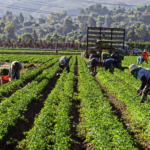
Migrant Rights? Not our problem …

Despite being urged to do so, Australia will not ratify the Migrant Workers Convention: one of the major human rights treaties of the world. The Australian Human Rights Commission and countries taking part in a review of Australia’s human rights performance under the UN universal periodic review, urged Australia to consider ratifying the International Convention on the Protection of the Rights of All Migrant Workers and Members of Their Families (Migrant Workers Convention). Australia will not even consider this recommendation. The Australian government response stated that “it views the existing protections for migrant workers as adequate” and that Australia “does not intend to become a party to ICRMW”. Australia has many migrant workers simply by virtue of the large immigration program Australia runs. Apart from thinking everything is “rosy” – this response says the rights of migrant workers are “not our problem”.
The Philippines, Mexico, Algeria, Bolivia, Argentina, Turkey, Bosnia and Herzegovina all called on Australia to consider ratifying the Migrant Workers Convention.
In 2009 Amnesty International and the Australian Council of Trade Unions both called on Australia to ratify the Migrant Workers Convention. Amnesty International said the following in relation to Australian ratification:
If Australia were to take the step of being the first wealthy developed nation to sign and ratify the Migrant Workers Convention, it would mark an historic breakthrough in the protection of migrant workers and members of their families. Finally, a country that is predominantly a ‘receiver’ of migrant workers would be committing itself to the protection of migrant workers’ rights. While continuing to benefit from the labour of migrant workers, Australia would be acknowledging their human rights and dignity.
During input to Australia’s universal periodic review the Australian Human Rights Commission recommended that Australia consider ratifying the Migrant Workers Convention, as a gap in Australia’s adherence to international human rights treaties. Other organisations making input commented on issues facing migrants in Australia.
The Australian Human Rights Commission reported on increased cyber-racism and hostility and violence experienced by new migrants, especially from Africa, India and immigrants of Muslim background. In a joint submission a large number of NGOs (“JS1”) noted that there was evidence of police targetting of new migrants, especially from Africa. The Australian Human Rights Commission remained concerned about cases of trafficking, as well as cases of forced labour and exploitation of migrant workers on business (long stay) visas subclass 457.
Beyond the issues nationally, the view that the protection of migrant workers is “adequate” ignores the role of international human rights treaties in establishing international standards of protection. Even if protection is adequate in any one country, it is certainly not adequate across the world. Sites such as Migrant Rights highlight the oppressive conditions migrant workers can face in parts of the world. December 18 and The Global Campaign for ratification of the Convention on Migrant Rights make the case for ratification.
In Southern Florida the vulnerability of migrant workers has led to a general situation of exploitation of farm workers, slavery like conditions and real instances of illegal slavery.
In the chilling words of Douglas Molloy, chief assistant United States attorney in Fort Myers, South Florida’s tomato fields are “ground zero for modern-day slavery.” Molloy is not just talking about virtual slavery, or near slavery, or slaverylike conditions, but real slavery. In the last fifteen years, Florida law enforcement officials have freed more than one thousand men and women who had been held and forced to work against their will … Workers were “sold” to crew bosses to pay off bogus debts, beaten if they didn’t feel like working or were too sick to work, held in chains, pistol whipped, locked at night into shacks in chain-link enclosures patrolled by armed guards. Escapees who got caught were beaten or worse. Corpses of murdered farmworkers were not an uncommon sight in the rivers and canals of South Florida.[1]
Organisations like the Coalition of Immokalee Workers campaign against such conditions.
Australia has ratified the Convention Against Torture. Australia is not one of the countries where torture is a noted problem. Australia has also just decided it will consider ratifying the Convention on Enforced Disappearances: also not a significant problem in Australia. The failure to even consider ratification of the Migrant Workers Convention because “we don’t have a problem”: is inconsistent.
Source: UN reports on Australia’s Universal Period Review:
http://www.ohchr.org/EN/HRBodies/UPR/PAGES/AUSession10.aspx
Image Source: http://www.flickr.com/photos/ari/2719440654/








